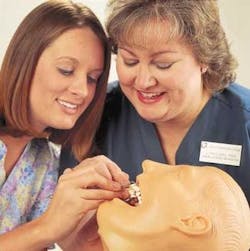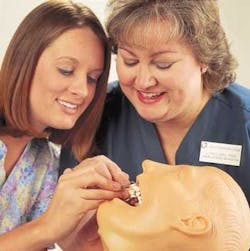The teacher in you
by Christine A. Dominick, RDH, MOcED, and Susan J. Jenkins, RDH, MS
After the Allied Directors Conference last June, I felt unsettled by some statistics that were shared. A shortage of dental hygiene faculty will reach a critical level in five to 10 years. When I learned this, I was trying to fill two faculty positions. I was amazed at the number of dental hygiene program directors who indicated they had positions unfilled for more than a year.
I felt strongly about this issue and wondered what I could do to encourage others to teach.
When I re-entered academia in 1997 after raising my family and spending more than 12 years in clinical practice, I interviewed for a position at a local college. The dean of academic affairs who interviewed me mentioned that I had not taught for a long time.
The comment surprised me. I thought I taught every day during my clinical practice. I determined the appropriate topic for each patient. I used evidence to support my instruction. I organized my thoughts and materials, presenting them in an interesting way. I involved the patient, and I gave homework (home care instructions).
This seemed like teaching to me! I have never forgotten his words, and I wondered if dental hygienists see themselves as teachers.
Conversations with hygienists in the field reveal that many don't want to continue chairside forever. One hygienist at the ADHA annual meeting in New York mentioned this to me, and I asked her if she had considered teaching. She smiled, intrigued by my question, but shrugged as if to say she couldn't do it. She did not see her years of experience as a valuable credential.
She was amazed when I told her that students could really benefit from her experience. She began to see herself in a new role. I told her that teaching in a dental hygiene school clinic is a wonderful way to give back to the profession, and that her contribution could make a difference.
I discussed my concerns with a colleague who had had a similar experience. We wanted to know if practicing dental hygienists viewed themselves as teachers. We prepared and administered a random sampling survey of practicing dental hygienists at the Massachusetts Dental Hygiene Association Annual Meeting in September 2003. Data was collected from 26 hygienists.
In response to the question, "In your role as a dental hygienist, do you view yourself as a teacher?" 7.7 percent responded no, and 7.7 percent were undecided. The remaining 84.6 percent clearly viewed themselves as teachers, reinforcing one comment: "We educate patients and co-workers everyday."
Other statements included:
• "I educate every patient about their dental hygiene and their oral health, and I demonstrate how to apply the information."
• "I spend the majority of my time educating during and after procedures."
• "I see myself as someone who imparts information, guides and helps people to learn."
• "I teach people from the ground up the etiology of gingivitis and periodontal disease to help them understand the need for proper home care and regular dental care."
• "The patient's problems come from a lack of understanding or awareness, and education can turn that around. I provide that education!"
When asked, "Have you considered teaching in a dental hygiene program?" 34.6 percent responded no, 7.7 percent did not respond, and 57.7 percent responded yes.
When asked "What's preventing you from teaching?" the overwhelming responses were time, money, and education.
There is a great need for dental hygienists to educate the next generation. There is no magic formula. You just have to call the dental hygiene program in your community and ask how you can help.
Christine A. Dominick, RDH, MOcED, is currently the chair of the dental hygiene department of Massachusetts College of Pharmacy and Health Sciences and the program director of the Forsyth Dental Hygiene Program in Boston. Under the name of Christine A. Sacchetti, she was the founding director of Mount Ida College and began her teaching career at New Hampshire Technical Institute in 1971. She has actively practiced dental hygiene for 36 years and is a site visitor for the Commission on Dental Accreditation. Christine can be contacted at [email protected]. Susan J. Jenkins, RDH, MS, is a full time assistant professor in the Forsyth Dental Hygiene program at Massachusetts College of Pharmacy and Health Sciences in Boston. She has practiced dental hygiene for 28 years and is currently the advisor to the Forsyth SADHA chapter and serves as the professional services director for the Forsyth Dental Hygiene Clinic. Susan can be contacted at [email protected].

